What are the three ways to implement tab in Vue?
Vue implements tabs in three ways: 1. Control tab content switching through "v-show"; 2. Implement tab switching through the is feature and "keep-alive" cache in vue; 3. Through "router" -link" to implement routing switching.
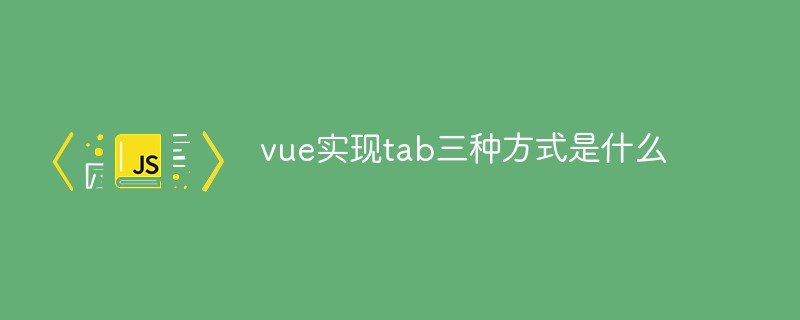
The operating environment of this tutorial: Windows 10 system, vue3 version, DELL G3 computer
What are the three ways to implement tab in vue?
3 ways for vue to implement tab switching and switching to maintain data status
3 ways for vue to implement tab switching
1. v-show Control content switching
1. Simple version principle: Use the click event to change the num value as a switch to control the tab style and content display and hiding.
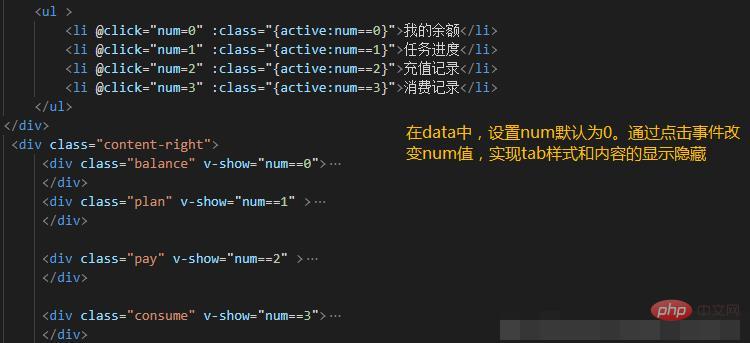
#2. Data rendering principle: mainly controlled by the index bound to v-for, similar to the above.
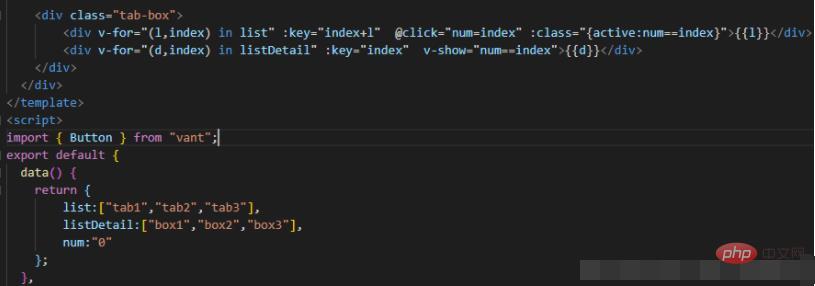
# 2. Component switching.
1. The knowledge points are mainly the characteristics of is in vue, and keep-alive cache
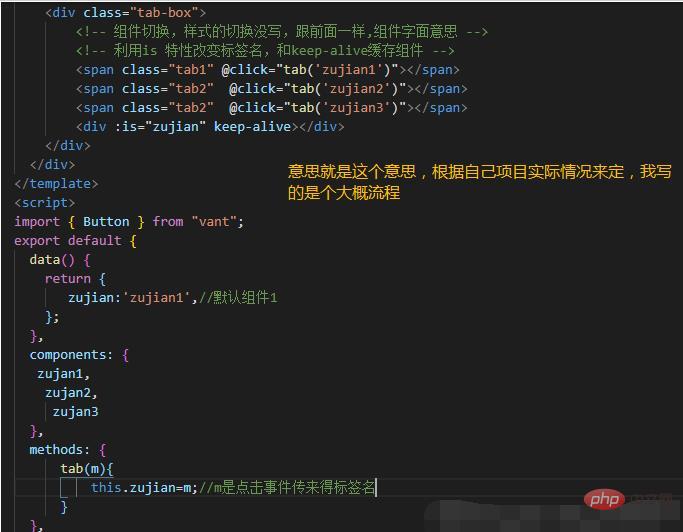
3. Route switching. (Friendly to the address bar and data requests)
Achieved through router-link.


vue tab switching maintains data status
When the page performs tab switching, since the component will be re-instantiated every time it is switched, we If you want the content in the tab to not be refreshed no matter how the page is switched, reducing page re-rendering and reducing requests
Implementation method: use
<el-tabs v-model="activeName" @tab-click="handleClick">
<el-tab-pane label="记录">
<keep-alive>
<child1 v-if="isChildUpdate"></child1>
</keep-alive>
</el-tab-pane>
</el-tabs>List page jump details, the list page keeps the last operation status
This is achieved by whether to load the router-view and routing meta meta setting page whether the page needs to be cached
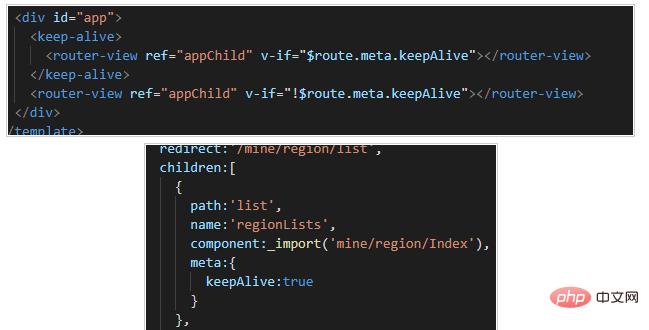

 If the router-view is nested in multiple layers, you may need to set up multiple layers, and then listen for route departure through beforeRouteLeave and set whether to cache
If the router-view is nested in multiple layers, you may need to set up multiple layers, and then listen for route departure through beforeRouteLeave and set whether to cache


//Jumping from other pages does not require caching the page. Returning from the details page requires caching
Recommended learning: "vue video tutorial"
The above is the detailed content of What are the three ways to implement tab in Vue?. For more information, please follow other related articles on the PHP Chinese website!

Hot AI Tools

Undresser.AI Undress
AI-powered app for creating realistic nude photos

AI Clothes Remover
Online AI tool for removing clothes from photos.

Undress AI Tool
Undress images for free

Clothoff.io
AI clothes remover

AI Hentai Generator
Generate AI Hentai for free.

Hot Article

Hot Tools

Notepad++7.3.1
Easy-to-use and free code editor

SublimeText3 Chinese version
Chinese version, very easy to use

Zend Studio 13.0.1
Powerful PHP integrated development environment

Dreamweaver CS6
Visual web development tools

SublimeText3 Mac version
God-level code editing software (SublimeText3)

Hot Topics
 1378
1378
 52
52
 How to add functions to buttons for vue
Apr 08, 2025 am 08:51 AM
How to add functions to buttons for vue
Apr 08, 2025 am 08:51 AM
You can add a function to the Vue button by binding the button in the HTML template to a method. Define the method and write function logic in the Vue instance.
 How to use bootstrap in vue
Apr 07, 2025 pm 11:33 PM
How to use bootstrap in vue
Apr 07, 2025 pm 11:33 PM
Using Bootstrap in Vue.js is divided into five steps: Install Bootstrap. Import Bootstrap in main.js. Use the Bootstrap component directly in the template. Optional: Custom style. Optional: Use plug-ins.
 How to reference js file with vue.js
Apr 07, 2025 pm 11:27 PM
How to reference js file with vue.js
Apr 07, 2025 pm 11:27 PM
There are three ways to refer to JS files in Vue.js: directly specify the path using the <script> tag;; dynamic import using the mounted() lifecycle hook; and importing through the Vuex state management library.
 How to use watch in vue
Apr 07, 2025 pm 11:36 PM
How to use watch in vue
Apr 07, 2025 pm 11:36 PM
The watch option in Vue.js allows developers to listen for changes in specific data. When the data changes, watch triggers a callback function to perform update views or other tasks. Its configuration options include immediate, which specifies whether to execute a callback immediately, and deep, which specifies whether to recursively listen to changes to objects or arrays.
 How to return to previous page by vue
Apr 07, 2025 pm 11:30 PM
How to return to previous page by vue
Apr 07, 2025 pm 11:30 PM
Vue.js has four methods to return to the previous page: $router.go(-1)$router.back() uses <router-link to="/" component window.history.back(), and the method selection depends on the scene.
 Vue realizes marquee/text scrolling effect
Apr 07, 2025 pm 10:51 PM
Vue realizes marquee/text scrolling effect
Apr 07, 2025 pm 10:51 PM
Implement marquee/text scrolling effects in Vue, using CSS animations or third-party libraries. This article introduces how to use CSS animation: create scroll text and wrap text with <div>. Define CSS animations and set overflow: hidden, width, and animation. Define keyframes, set transform: translateX() at the beginning and end of the animation. Adjust animation properties such as duration, scroll speed, and direction.
 How to use vue pagination
Apr 08, 2025 am 06:45 AM
How to use vue pagination
Apr 08, 2025 am 06:45 AM
Pagination is a technology that splits large data sets into small pages to improve performance and user experience. In Vue, you can use the following built-in method to paging: Calculate the total number of pages: totalPages() traversal page number: v-for directive to set the current page: currentPage Get the current page data: currentPageData()
 How to use function intercept vue
Apr 08, 2025 am 06:51 AM
How to use function intercept vue
Apr 08, 2025 am 06:51 AM
Function interception in Vue is a technique used to limit the number of times a function is called within a specified time period and prevent performance problems. The implementation method is: import the lodash library: import { debounce } from 'lodash'; Use the debounce function to create an intercept function: const debouncedFunction = debounce(() => { / Logical / }, 500); Call the intercept function, and the control function is called at most once in 500 milliseconds.




